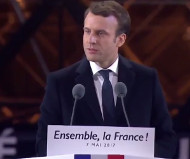5/12/2017
Incoming French President To Continue Anti-Motorist PoliciesEmmanuel Macron becomes the French president Sunday after pledging to expand speed camera use and raise taxes on fuel.

When Jean-Marie Le Pen appeared as the National Front's candidate for president of France ten years ago, he pledged to get rid of speed cameras. In last Sunday's election, Le Pen's daughter, Marine Le Pen lost by a wide margin to Emmanuel Macron, who as a candidate pledged to expand the number of speed cameras.
"I know that automated control is very popular among your readers," Macron sarcastically told the French publication Moto Mag. "As a road user, it wouldn't be true if I told you that I have never complained about speed cameras or that I've never reduced my speed a bit while approaching an automated radar camera. But if one takes a step back, you see things differently."
Macron then credited cameras for France's reduction in annual fatalities from 18,000 in 1972 to 3500 today.
"It is necessary to continue deploying new speed cameras with new features to ensure that speed limits are respected and to fight, with severity, those offenses that cause the greatest number of victims (notably, driving with alcohol or a telephone)," Macron wrote in response to questions from the pro-motorist group Forty Million Motorists.
When speaking with anti-motorist groups, Macron endorsed the idea of lowering speed limits, enforced with the existing zero tolerance policy that imposes stiff fines and license points for anyone accused by a machine of exceeding the limit by 10km/h (6 MPH), or less.
"Beyond a technical margin of error, the sanctions must exist as deterrence to enforce regulations," Macron wrote.
Macron takes over from Francois Hollande this Sunday in an investiture ceremony at the Elysee presidential palace. Hollande and his predecessor, Nicolas Sarkozy, both expanded the use of automated ticketing machines from 2200 cameras in 2012 to 4200 in 2015. Over 13 million tickets were issued in 2015, generating 789 million euros (US $861 million) in net profit.
Even more money would flow to the French treasury under Macron's promise to raise the cost of gasoline by increasing the carbon tax. He was particularly interested in hiking the cost of diesel fuel, which powers two-thirds of French vehicles.


